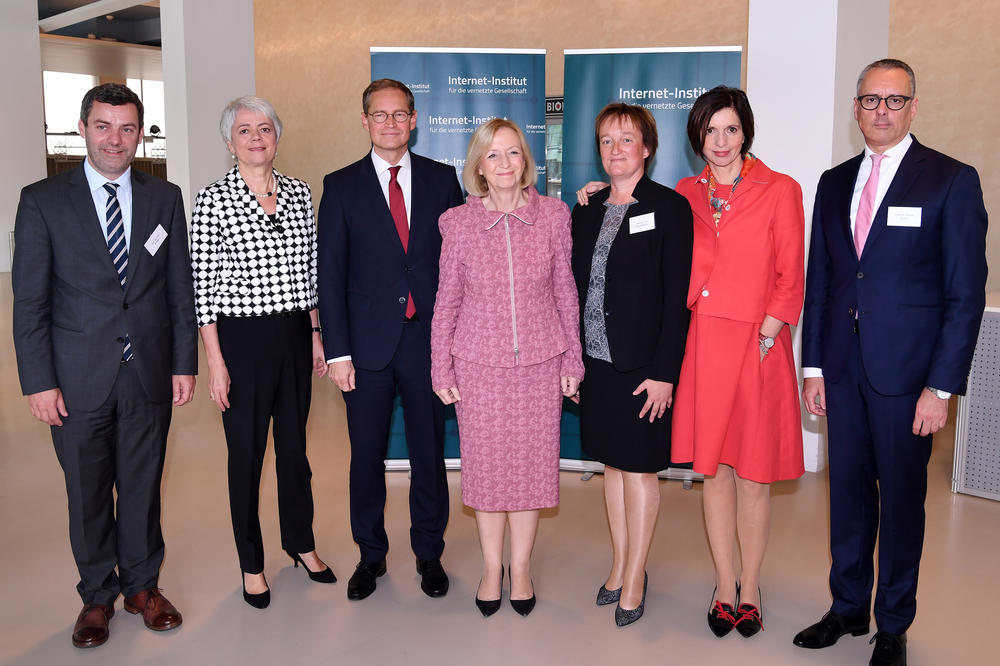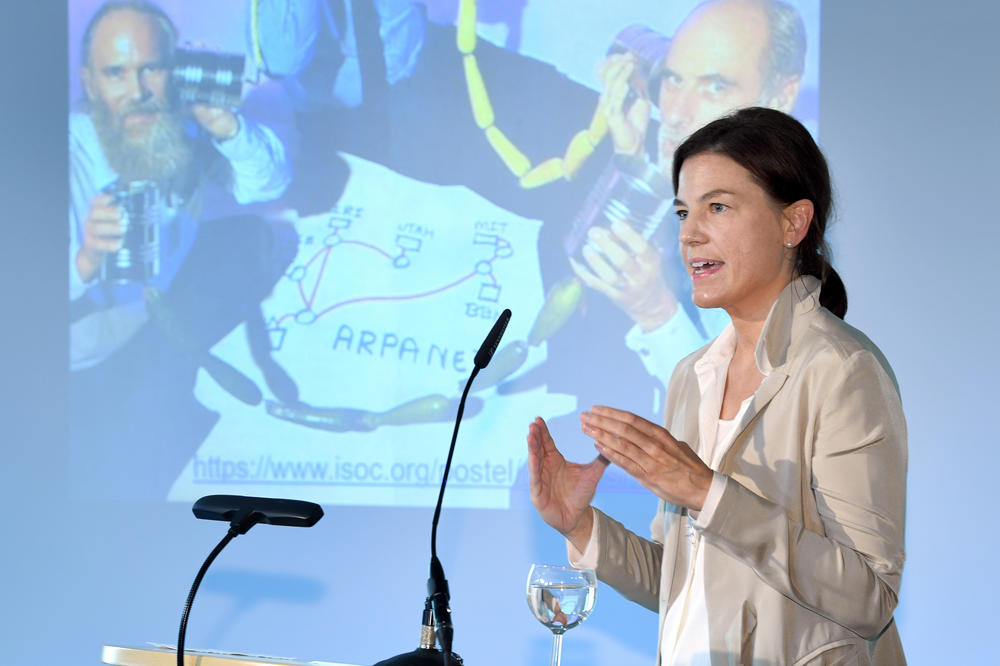Guidelines for the Digital Transformation
The Weizenbaum Institute for the Networked Society in Berlin has opened. The aim of its interdisciplinary research team is to seek out ways of securing participation and democratic autonomy in the digital age.
Sep 27, 2017
Left to right: Prof. Dr. Metzger, State Secretary Quennet-Thielen of the Ministry of Education and Research; Berlin’s governing mayor Müller, Federal Minister for Education and Research Prof. Dr. Wanka, Prof. Dr.-Ing. Schieferdecker, Prof. Dr. Allmen
Image Credit: Peter Himsel
The German Internet institute will carry the official name “Weizenbaum Institute for the Networked Society.” Announced during the institute’s inauguration, the choice of name is indicative of a commitment, since the German-American computer scientist Joseph Weizenbaum (1923–2008), who the institute is named after, was not only a pioneer of the Internet, but from its beginning a severe critic of the digital turn. In the face of ever more intelligent and powerful instances of artificial intelligence, he was concerned enough to issue a warning: the power of decision making must always reside with human beings. “Weizenbaum was both expert and professional doubter,” said German Federal Minister for Education and Research, Johanna Wanka. Together with the governing mayor of Berlin, Michael Müller, Wanka was invited to the opening ceremony in the concert hall of the Berlin University of the Arts. “Weizenbaum is a name associated with curiosity and openness, as well as deliberation and critical thought.”
At the Weizenbaum Institute, around 100 researchers will examine the changes digitalization is wringing on society. “The turn affects every one of us,” says Ina Schieferdecker, professor of computer science at Technische Universität Berlin and one of the founding directors of the new institute. “We can use it to attain a better quality of life, sustainability, and security – but we must also keep in mind the risks and put guidelines in place in order to avoid negative developments.” A core question is how to assure participation and democratic autonomy in a networked society.
And one consideration within that question is interdisciplinary input. Researchers from the fields of social science, economics, law, and design as well as computer science work together and across institutional boundaries. Participating in research are the four Berlin universities (Freie Universität, Humboldt Universität, Technische Universität, and Berlin University of the Arts) and the University of Potsdam, as well as the Fraunhofer Institute for Open Communication Systems and the Berlin Social Science Center.
Who governs the Internet? Dr. Catharina Maracke researches the interaction of law, technology, and society.
Image Credit: Peter Himsel
Schieferdecker and her colleagues Axel Metzger, professor of law at Humboldt-Universität, and Martin Emmer, professor of communication science at Freie Universität presented the research program at the opening ceremony. Its focal points range from changes in the world of work and politics through to complex questions of law. Everyday phenomena, such as addiction to mobile devices, will also be investigated.
Berlin’s governing mayor, Michael Müller, was evidently delighted about the new research institution. He said, “The Weizenbaum Institute is confirmation of the advance of our digitalization strategy. It is a clear sign of the value of cooperation, both between the federal and state governments as well as between the various research institutions.”
Following a nationwide tender procedure, Berlin-Brandenburg was awarded the contract in May 2017. The German Federal Ministry for Education and Research is making 50 million euros available in the first five years. The state of Berlin will cover the costs of the building and furnishing of the office space to the tune of 5.2 million euros. The future address of the Weizenbaum Institute is Hardenbergstrasse 32 in Charlottenburg, not far from Berlin’s University of the Arts.
The institute will start its work as soon as possible, with the first tender procedure information already online. There will be five professorships at the institute – as well as provision for 40 doctoral candidates, 20 postdocs, and 20 research fellows; these researchers will be stationed at the institute for a specific period. Schieferdecker can barely wait for the work to begin. In her opening address at the ceremony, she said, “If you would like to work or cooperate with us, or have any criticism, wishes or suggestions, come and talk to us – right away, if you can!”


